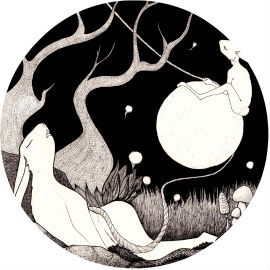
An image, source unknown (I stumbled across it online), which partly inspired the characters Emmeline and Mathilde (the Salt Lane Witches) in Rupetta. According to Pinterest, the image was taken in Australia: if you know anything about the image’s heritage I’d love to hear from you 🙂
The ‘Salt Lane Witches’ name isn’t one I made up, but stole or borrowed, depending on how you think about those kinds of things, from a piece of folklore related by Edward Corbett and collected on a site dedicated to sharing various historical stories about Worcester. I find it’s a very common part of my writing process to incorporate sly, tangled, sometimes ironic or playful references to other texts, images or ideas. There are all kinds of reasons that this small story of the Salt Lane Witches seemed the perfect, quiet, almost-secret reference point for Mathilde and Emmeline’s tale. His story goes thus:
Two old women, who lived in Salt Lane (Castle St), at Worcester, were known witches who cured ailments and gave medicines, and always had money to pay their way, but they obtained it by a kind of wagon tax.
Often a heavily laden salt wagon would get stuck in it, and do what the horses and wagoners could, they never could start it. Then one of the old women would come out of the house and offer to help. The wagoner would give her sixpence and she would stroke the wheel-horse and bless them, and the cart would immediately draw out and go ahead easily.
But one day a driver who had often paid his sixpence, came lightly loaded and reckoned he could pass through the mire easily. But once again his wagon stuck fast. The same old woman came to her door and offered to help, and he answered her across the wheel-horse’s back, and as he did so he noticed a straw lying across the horse’s back.
He pulled out his knife and cut it in two, and thereat the horses screamed and leapt out of their footholds, and the team and wagon went crashing down the lane — but then in a wallow of blood and mire lay the body of the other old woman — cut in two.
I love, in this tale, the detail of the straw that the wagoner sees lying across the horse’s back, which reminds me of one of my mother’s favourite sayings about ‘this’ (usually, something I had done) being ‘the straw that broke the camel’s back’.
I’m also always struck by the image of a salt wagon: an image that appears in a few folkloric/oral history tales, such as one about the founding of Meharry Medical College (MMC) in Nashville, Tennessee. According to the mission statement on their website, MMC “places special emphasis on providing opportunities for people of color, individuals from disadvantaged backgrounds, and others regardless of race or ethnicity; delivering high quality health services; and conducting research that fosters the elimination of health disparities”. The founding story of Meharry involves … a salt wagon stuck in a ditch, and the intervention of an unknown family of recently freed slaves. On the college’s website there’s a short version of the tale that begins with this anecdote:
In the 1820s, 16-year-old Samuel Meharry was hauling a load of salt through Kentucky when his wagon slid off the road into a muddy ditch. With rain and nightfall limiting his options, Samuel searched for help.
He saw a modest cabin that was home to a black family recently freed from slavery. The family, still vulnerable to slave hunters paid to return freedmen to bondage, risked their freedom to give Meharry food and shelter for the night.
At morning’s light, they helped lift the wagon from the mud and Meharry continued his journey. The black family’s act of kindness touched young Meharry so deeply that he vowed to repay it. I have no money now, he said as he departed, but, when I am able, I shall do something for your race.

Meharry College Image of the mired salt wagon
In Rupetta, the fictional characters of Mathilde and Emmeline do not run a school for Black students, or a medical school, nor do they charge sixpence to help you out if you get bogged outside their property: they provide free education, housing and care for homeless and orphaned children, particularly the children of revolutionaries imprisoned or murdered because of their involvement with the Oikos movement. And they aren’t really witches, except in the sense that many women who live together, without men, and provide free care and education, and are unusual or different, are often labelled witches in white western culture. But they are sneaky, and powerful, and ultimately, divided [oops! Spoiler alert!].
They work hard, and largely invisibly, to provide love, succour, education and agency to the most vulnerable in their community, breaking laws/committing heresy in order to do so. They are also deeply ethical, morally engaged women. Well, at least, that’s how I thought of them while I was writing the book: as women who sacrificed their own happiness and wellbeing for that of others.

No Comments